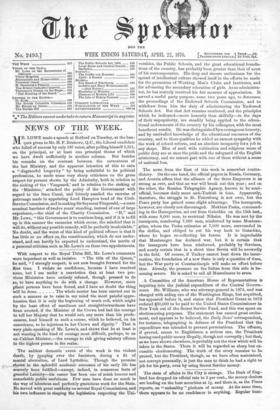The saddest domestic event of the week is the violent
death, by kiimping over the banisters, during a fit of mental aberration, of Lord Lyttelton. Though the promise __shown in the splendid academic successes of his early life has scarcely been fulfilled—except, indeed, in numerous feats of graceful Latinity—his career has been one of much honour and remarkable public usefulness. Few men have done so much in the way of laborious and perfectly gratuitous work for the State. He served with great assiduity on several Royal Commissions, and his own influence in shaping the legislation respecting the Uni- versities, the Public Schools, and the great educational founda- tions of the country, has probably been greater than that of most of his contemporaries. His deep and sincere enthusiasm for the spread of intellectual culture showed itself in the efforts he made for the promotion of Working Men's Clubs and Institutes, and for advancing the secondary education of girls. As an administra- tor, he has scarcely received his fair measure of appreciation. It served a useful party purpose, some two years ago, to denounce the proceedings of the Endowed Schools Commission, and to withdraw from him the duty of administering the Endowed Schools Act. But that Act remains unaltered, and the principles which he indicated—more honestly than skilfully—in the days of their unpopularity, are steadily being applied to the educa- tional endowments of the country by his colleagues, with the most beneficent results. He was distinguished by a courageous honesty, and by unrivalled knowledge of the educational resources of the country, and to these qualities he added an earnest sympathy with. the work of school reform, and an absolute incapacity for a job in. any shape. Men of such wide cultivation and religious sense of public duty are at once the pride and the safeguard of the English aristocracy, and we cannot part with one of them without a sense of national loss.






























